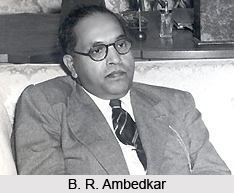 After the Second World War, Babasaheb was elected to the Constituent Assembly to decide the way that India - a country of millions of people - should be ruled. How should elections take place? What are the rights of the people? How are laws to be made? Such important matters had to be decided and laws had to be made. The Constitution answers all such questions and lays down rules. This responsibility was entrusted to Ambedkar. When India became independent in August 1947, Babasaheb Ambedkar became First Law Minister of Independent India. The Constituent Assembly made him chairman of the committee appointed to draft the constitution for the world`s largest democracy.
After the Second World War, Babasaheb was elected to the Constituent Assembly to decide the way that India - a country of millions of people - should be ruled. How should elections take place? What are the rights of the people? How are laws to be made? Such important matters had to be decided and laws had to be made. The Constitution answers all such questions and lays down rules. This responsibility was entrusted to Ambedkar. When India became independent in August 1947, Babasaheb Ambedkar became First Law Minister of Independent India. The Constituent Assembly made him chairman of the committee appointed to draft the constitution for the world`s largest democracy.
All his study of law, economics, and politics made him the best qualified person for this task. A study of the Constitutions of many countries, a deep knowledge of law, knowledge of the history of India and of Indian Society - all these were essential. In fact, he carried the whole burden alone. He alone could complete this huge task.
After completing the Draft Constitution, Babasaheb fell ill. At a nursing home in Bombay he met Dr. Sharda Kabir and married her in April 1948. On November 4, 1948 he presented the Draft Constitution to the Constituent Assembly, and on November 26, 1949 it was adopted in the name of the people of India. On that date he said: -I appeal to all Indians to be a nation by discarding castes, which have brought separation in social life and created jealousy and hatred."
The text prepared by Ambedkar provided constitutional guarantees and protections for a wide range of civil liberties for individual citizens, including freedom of religion, the abolition of untouchability and the outlawing of all forms of discrimination. Ambedkar argued for extensive economic and social rights for women, and also won the Assembly`s support for introducing a system of reservations of jobs in the civil services, schools and colleges for members of scheduled castes and scheduled tribes, a system akin to affirmative action. India`s lawmakers hoped to eradicate the socio-economic inequalities and lack of opportunities for India`s depressed classes through this measure, which had been originally envisioned as temporary on a need basis. The Constitution was adopted on November 26, 1949 by the Constituent Assembly. Speaking after the completion of his work, Ambedkar said, "I feel that the Constitution is workable; it is flexible and it is strong enough to hold the country together both in peace time and in war time. Indeed, if I may say so, if things go wrong under the new Constitution the reason will not be that we had a bad Constitution. What we will have to say is that Man was vile."
Ambedkar resigned from the cabinet in 1951 following the stalling in parliament of his draft of the Hindu Code Bill, which sought to expound gender equality in the laws of inheritance, marriage and the economy. Although supported by Prime Minister Nehru, the cabinet and many other Congress leaders, it received criticism from a large number of members of parliament. Ambedkar independently contested an election in 1952 to the lower house of parliament, the Lok Sabha but was defeated. He was appointed to the upper house of parliament, the Rajya Sabha in March 1952 and would remain a member until his death.






